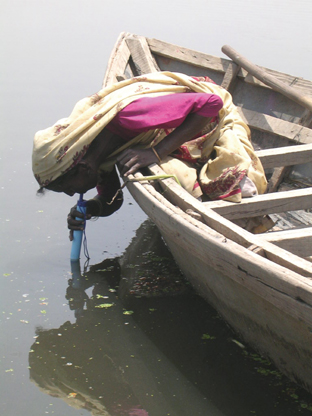With a view overlooking the lush green campus of the Weizmann Institute of Science, Dr. Moshe Frommer, general manager of the Rehovot-based company, Purofilter®, sits on his home balcony in Rehovot and reminisces. It was here that he first arrived, 45 years ago, as a young doctoral student studying under the guidance of Prof. Israel Millo in the Institute's Polymer Department. Since then, much water has flown down many rivers, including the Yarkon River, which is host to a collection of germs and pollutants. But Frommer’s work over those years has resulted in an invention that allows one to drink from it without any fear for one’s health.
Time magazine chose this invention as “one of the most amazing inventions of 2005”; it received an INDEX International Design and Innovation Award for “the design most likely to improve life for many people”; and the February 2006 issue of Forbes magazine has selected it as one of the “10 things that will change the way we live.”
The invention is a reusable plastic straw containing a long-lasting filter filled with bacteria-killing resins. In the time it takes to suck the polluted water up the 30 cm length of the LifeStraw®, the water gets purified, reaching the drinker’s mouth completely germ free.
Frommer: “Around one-sixth of the world’s population suffers from a shortage of clean drinking water. Every day, thousands die from waterborne diseases. My dream has been to help find a solution for those millions of people that are faced with this problem. Today, that dream is close to becoming a reality. About two million already use the water purification straws, and I hope that in the near future, the tens of millions of people in countries that don’t have access to clean drinking water will be able to benefit from them.” A single straw, which can be hung around the neck for personal use, costs only three dollars and can filter 700 liters – the amount of water a single person drinks in a year. Tests show that the filter kills a large variety of bacteria and viruses, and the straw does not clog from cloudy or turbid water. Last, but certainly not least, the purified water also tastes good.
Dr. Frommer received his B.Sc. and M.Sc. in chemistry from the Technion, and his Ph.D. from the Feinberg Graduate School at the Weizmann Institute of Science. He remembers his years of research, in what was then the Polymer Department, as among the best of his life, and he still meets from time to time with his Ph.D. adviser, Prof. Millo, and other friends he made at that time. After graduating, he went on to work at Hydranautics, a company based in the industrial park next to the Weizmann Institute, which made membranes for desalinization. In the following years, he continued to work on developing various methods of water purification.
LifeStraw® was born about three years ago when a Danish company came up with the idea and was looking for someone who could help fulfill its requirements. They approached Frommer who, through his expertise, was able not only to supply the suitable germ-killing material for the straws, but also to design the structure and composition of the LifeStraw® itself. The bactericidal resin is presently produced in Israel; the plastic straws in China. Today, the straws are distributed by humanitarian aid organizations. Time correspondents, for instance, first learned of them in Pakistan, where they were given to earthquake victims.
Frommer runs the whole enterprise by computer from his home near the Institute. “The sight of the Institute is a constant reminder of values I absorbed while studying there,” he muses. “Curiosity, sticking to goals, the will to help people better their situations – I feel lucky that I’ve been able to turn these values into deeds.”
The Right to Water
The burden of waterborne diseases that plague the developing world is immense. According to statistics provided by the World Health Organization:*
• 1.8 million people die of a diarrheal disease (including cholera) every year, 90% of them children under 5
• 88% of these deaths are attributed to unsafe water supplies, inadequate sanitation and lack of hygiene
• Improved water supply reduces diarrhea morbidity by between 6% and 25%

